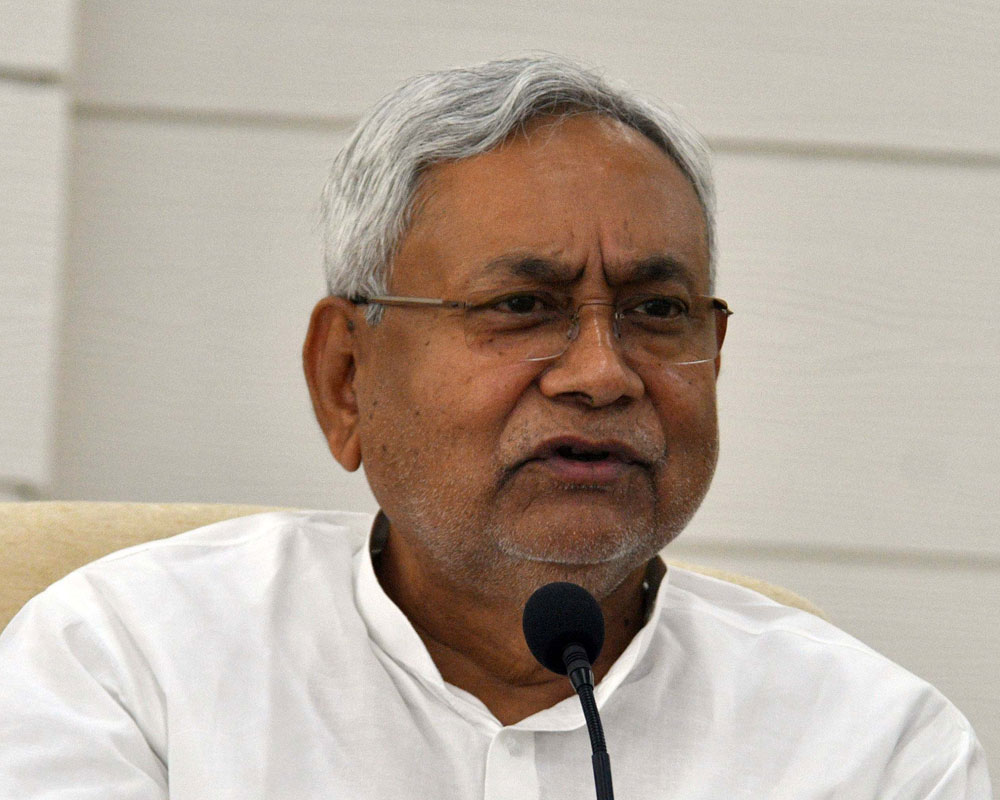Bihar chief minister Nitish Kumar on Tuesday quipped “janata maalik hai (the public is the master)”, asked about the Aam Aadmi Party’s resounding victory in the Delhi Assembly elections.
He then walked away, with folded hands.
The irony was not lost as Nitish, who professes allegiance to socialist principles, had just inaugurated a statue of Deendayal Upadhyaya, the late ideologue of the Rashtriya Swayamsevak Sangh and the Bharatiya Jana Sangh, the BJP’s forerunner.
Nitish inaugurated the statue at Patna’s posh Rajendra Nagar locality while the votes were being counted in Delhi.
His party, the Janata Dal United, had contested two Assembly seats that ally BJP had spared as a gesture of accommodating smaller parties. The AAP won both.
JDU sources said the Bihar chief minister’s succinct response held a message of caution to the BJP. “Nitishji speaks less, but his words are full of depth. The way the BJP has focused on the Citizenship (Amendment) Act, National Population Register and National Register of Citizens has not gone down well with the people. They are agitating across the entire country, including Delhi where Shaheen Bagh has become a symbol of resistance,” a senior JDU leader told The Telegraph but asked not to be named.
“Public unhappiness has reflected in the Delhi election results. It is high time not only for the BJP but also for its allies to review where they stand among the people.”
The JDU leader said Assembly elections were due in Bihar towards the end of the year and the BJP’s recent losing spree in states did not augur well for the National Democratic Alliance.
“Any win in any state against the BJP energises the opposition parties. After Maharashtra and Jharkhand, the Delhi poll results are bound to give a boost to the “opposition parties in Bihar too,” the leader said.
JDU secretary-general K.C. Tyagi, however, asserted that the people were not angry with the NDA. “If people had been angry, how could the NDA have won 350 seats in the Lok Sabha elections last year or 39 of the 40 Lok Sabha seats in Bihar?” Tyagi said, when asked about Nitish’s comment.
“They have accepted Prime Minister Narendra Modi at the national level and a tested Arvind Kejriwal in Delhi. They have accepted Nitish Kumar in Bihar. If there is pro-incumbency for a leader, the voters in his area are not swayed by anything.”
Tyagi cited the example of the Burari Assembly constituency in Delhi, where the JDU and its rival RJD were pitted against each other in a fight billed as a mini-Bihar election as a large number of voters there are from the state.
“Though we lost there, the RJD got around 1,000 votes while we got 20,000 votes. If we see it from Bihar’s perspective, Nitish is way ahead than the face of the opposition Grand Alliance in Bihar. The Delhi results will impact the Bihar polls in a manner that the tested face that has credibility, acceptability and respectability — Nitish Kumar — with huge pro-incumbency will win,” Tyagi said.
The results in Delhi — where Arvind Kejriwal’s AAP was ahead in over 60 of the capital’s 70 seats — also reminded of the recent rebellion of two former JDU leaders: poll-strategist Prashant Kishor and former diplomat Pavan K. Varma.
Kishor and Varma, who were JDU national vice-president and national general secretary then, were dead against the party expanding ties with the BJP in Delhi and had wanted Nitish to take a stand against the CAA-NPR-NRC citizenship matrix.
Their comments, remarks and letters on social media led to acrimony and both were eventually thrown out of the party. Tuesday’s results seem to have vindicated their stand.
Nitish faced criticism from opposition leaders for inaugurating Upadhyaya’s statue. “It’s a mistake that people think of Nitish as a socialist leader. He is not,” RJD Bihar president Jagadanand Singh said. “He lost it long ago when he shook hands with the BJP and the RSS.”











